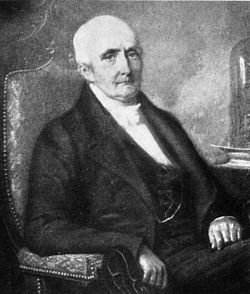Nicolas Theodore de Saussure
| Nicolas-Théodore de Saussure | |
|---|---|

Nicolas-Théodore de Saussure
|
|
| Born |
14 October 1767 Geneva, Switzerland |
| Died | 18 April 1845 (aged 77) Geneva, Switzerland |
| Nationality | Swiss |
| Scientific career | |
| Fields |
chemistry, , plant physiology, photosynthesis |
| Institutions | University of Geneva |
| Influences | Antoine Lavoisier, Jean Senebier, Charles Bonnet |
| Influenced | Justus von Liebig, Jean-Baptiste Boussingault |
| Author abbrev. (botany) | N.T.Sauss. |
Nicolas-Théodore de Saussure (14 October 1767, in Geneva – 18 April 1845, in Geneva ) was a Swiss chemist and student of plant physiology who made seminal advances in . He is one of the major pioneers in the study of photosynthesis.
Nicolas-Théodore de Saussure was born into a wealthy, aristocratic, Swiss family, many of whose members were accomplished in the natural sciences, including botany. He was the second child of Horace-Bénédict de Saussure (1740-1799), who was an eminent geologist, meteorologist, physicist and Alpine explorer, and Albertine-Amélie Boissier (1745-1817). His great uncle, Charles Bonnet, was a famous naturalist whose research included experiments on plant leaves. His grandfather Nicolas de Saussure was a noted agriculturist, for whom Nicolas-Théodore was named. Nicolas-Théodore was called "Théodore" to distinguish him from his grandfather, and he published his professional papers under the name Théodore de Saussure after his father died. (While his father was alive, Théodore's papers were published under the name "de Saussure fils," as was the custom of the day for the sons of scientists having the same surname.)
Nicolas-Théodore and his two siblings were educated at home by their father. From 1782-1786, he attended the l'académie de Genève, where he studied math, science, and history. During the early years of the French Revolution he traveled abroad, meeting with eminent scientists in London. He traveled abroad again in the late 1790s, and in 1800 became acquainted with Parisian scientists and other luminaries. While there, he took courses in chemistry and presented a paper. Upon returning to Geneva in 1802, he accepted an honorary professorship of mineralogy and geology at the University of Geneva. Although he taught very little, he remained on the faculty until 1835. He lived quietly and somewhat reclusively, doing research in his own private laboratory (as was the custom for scientists of his day), but, like others in his family, he was active in public affairs in Geneva, and he served on the Genevan representative council.
...
Wikipedia
